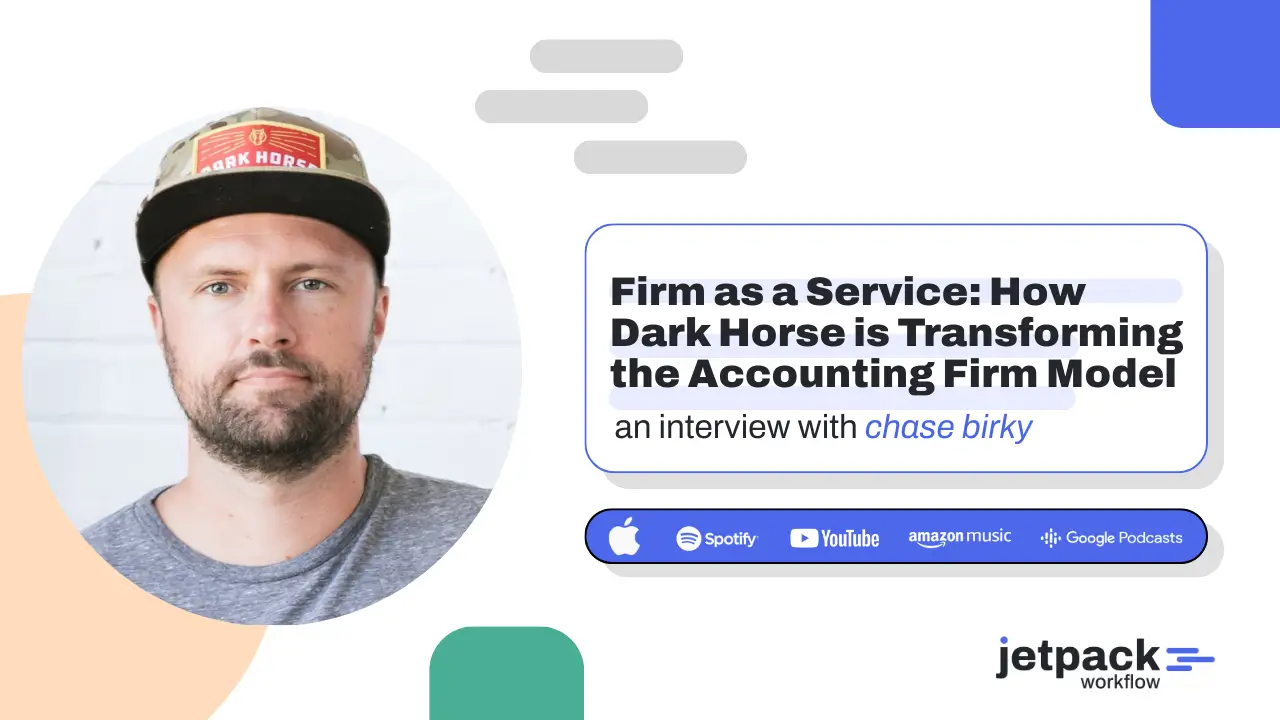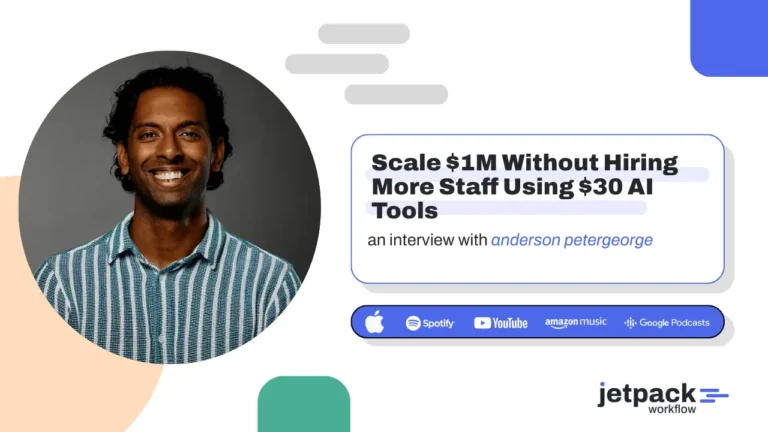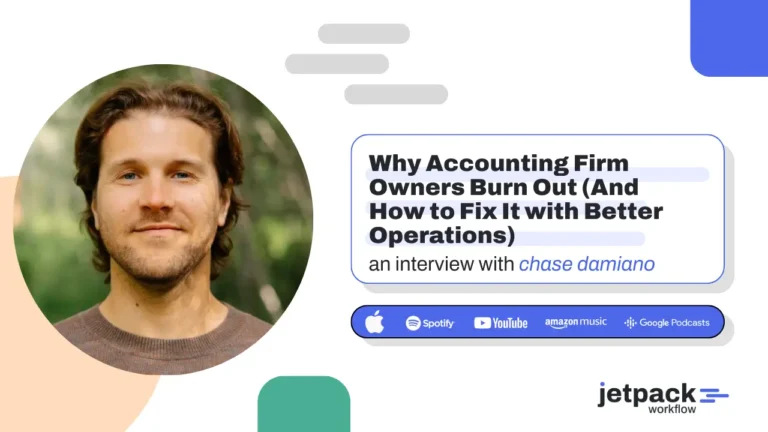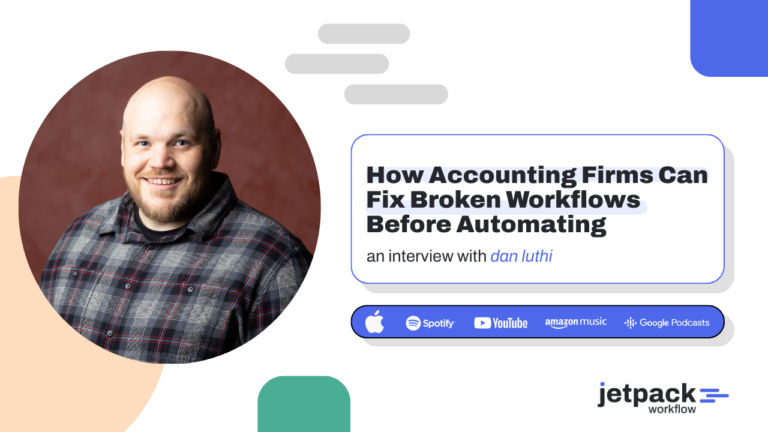Firm as a Service: How Dark Horse is Transforming the Accounting Firm Model

Podcast
Firm as a Service (FaaS) is a model that gives accountants the entire infrastructure of a firm technology, staffing, marketing, and support so they can focus on serving clients and scaling their practice.
Unlike traditional partnerships or franchises, FaaS lets accountants retain ownership of their client base while benefiting from shared systems and resources.
In a recent Growing Your Firm podcast, David Cristello, Founder of Jetpack Workflow, spoke with Chase Birky, CEO of Dark Horse, about how this approach is reshaping firm ownership.
Key Takeaways
- Firm as a Service (FaaS) provides full infrastructure for accountants, not just software.
- Dark Horse’s Accelerator Program helps experienced accountants launch firms with training, leads, and salary support.
- Successful accelerators set strong boundaries with clients and follow the growth playbook.
- Principals keep ownership of their book of business while benefiting from shared resources.
- AI and data-driven workflows are seen as key accelerators for firm scalability.
- Chase Birky warns that private equity often disadvantages rising partners in traditional firms.
From Misery in Public Accounting to Entrepreneurship
Chase began his career in public accounting but quickly realized the traditional path was not sustainable for him.
“I was miserable in public accounting until I started my own firm. That came at a substantial financial, personal, and relational cost.”
That dissatisfaction drove him to entrepreneurship. He started a practice focused on tax and bookkeeping, but challenges around partnerships, scalability, and structure pushed him to reimagine the firm model entirely.
Why Traditional Partnerships Often Fail
Many accounting firms are built on partnerships, but Chase believes this model frequently creates long-term problems.
“Partnerships are something a lot of accountants get into too easily, not realizing the complexity of what that relationship is. If you do not have a clear blueprint of who will step into the CEO role and who will step into the COO role, it creates politics, toxicity, and bureaucracy as the firm grows.”
Without a clear growth path for staff, recruiting is difficult. Chase noted that once a firm reaches around ten employees, leadership roles must be defined to avoid stagnation.
Defining “Firm as a Service”
Chase explained that Dark Horse is not a franchise, though some comparisons are made.
“Sometimes we will explain it like a franchise on steroids to give people an instant mental model. But really, what we have coalesced around is Firm as a Service. That is not just software. It is the totality of the firm infrastructure you need from seed to scale to exit.”
Dark Horse provides workflow software, staffing, HR, sales and marketing, and a collaborative peer network. It allows accountants to scale without building infrastructure alone.
The Accelerator Program: Building Principals from Scratch
The Accelerator Program helps experienced accountants start their own practice under Dark Horse.
Key elements include:
- Buy-in of $100,000 with only 10 percent down
- Salary support during the program
- Qualified leads and sales training
- P&L ownership from day one
Chase described the variability of success:
“It is a playbook. If you follow it, it works. The only thing we cannot guarantee is that timeframe of how long it is going to be. We have had a recent accelerator who in four months got above $400K. We have had others that have taken a full year just to get above $200K.”
Characteristics of High-Performing Accelerators
Over time, Dark Horse has identified traits that predict success.
“We have found that when someone is nicer than average, highly agreeable, and content, it puts them behind in terms of the assertiveness they need. If you cannot set boundaries and expectations with clients, you end up building a practice that runs your life.”
The most successful accelerators are those who confidently set pricing and scope from the beginning and avoid signing poor-fit clients.
Principals and the Firm Ownership Model
Dark Horse also brings in existing firm owners with $200K to $2M in revenue. These practitioners often struggle with recruiting or managing the business side of ownership.
Unlike a franchise, principals at Dark Horse retain ownership of their book of business.
“The book of business that they build is theirs. We are here to serve them in ways they cannot easily replicate on their own. It is about creating much more value than the take.”
All principals operate under the Dark Horse brand but run their own P&L, sharing resources and collaborating rather than competing.
Deposits, Equity, and Culture
Joining Dark Horse requires a financial deposit equal to about six weeks of fully loaded payroll. This ensures long-term commitment.
“If you are looking at this as anything less than a five-year journey, we are not the place for you. We need principals who are engaged with the community and buy into the mission.”
Principals also receive shares in Dark Horse, aligning their interests with the company’s growth. The culture emphasizes collaboration and an “outward mindset” where principals support each other’s success.
AI as an Operational Lever
Chase is optimistic about the role of AI.
“We can leverage the data that lives within our Microsoft ecosystem and use an LLM over the top. A lot of what stumbles CPAs is one-off, nuanced issues. Aggregating all that data and making it accessible will create enormous operational leverage. AI is going to be an accelerant.”
AI will improve knowledge sharing and make workflow automation more effective.
Chase’s Perspective on Private Equity
Finally, Chase shared his concerns about private equity (PE) in accounting.
“The rising partner often gets the short end of the stick. Senior partners take the big check, while those coming up are left with less ownership, more pressure, and less compensation. The social contract of becoming a partner has been unilaterally changed.”
While PE introduces structure, he believes many deals disadvantage future leaders of the firm.
Key Takeaways for Firm Owners
The Firm as a Service model challenges the traditional accounting firm structure by combining workflow software, infrastructure, and collaboration into a single platform. For accountants struggling with scalability or burnout, it offers an alternative path.
For more information, Chase recommends connecting with him on LinkedIn or reaching out to Justin Kern, CRO of Dark Horse.
Frequently Asked Questions
What is Firm as a Service?
Firm as a Service (FaaS) is a model that gives accountants the complete infrastructure of a firm. This includes workflow software, HR support, sales, marketing, and technology, allowing firm owners to scale their practice without having to build these systems on their own.
How does the Dark Horse Accelerator Program work?
The Accelerator Program is designed for experienced accountants who want to launch their own practice inside Dark Horse. It requires a $100K buy-in with 10 percent down and provides salary support, qualified leads, business development coaching, and profit and loss ownership from the first day.
How is Dark Horse different from a franchise?
Dark Horse is not a franchise. Unlike a franchise that takes revenue from the top, Dark Horse allows principals to retain ownership of their book of business. They operate under the Dark Horse brand, run their own profit and loss, and access shared infrastructure and resources while keeping control of their clients.
What challenges does Firm as a Service solve for accountants?
Firm as a Service helps solve common challenges that firm owners face such as missed client deadlines, lack of standardization, limited visibility into team workload, difficulty recruiting, and limited ability to scale. It creates efficiency, accountability, and growth opportunities for accounting firms of all sizes.
See How Workflow Automation Works in Practice
Discover how Jetpack Workflow helps accounting firms manage tasks, track client deadlines, and stay profitable as they grow.






